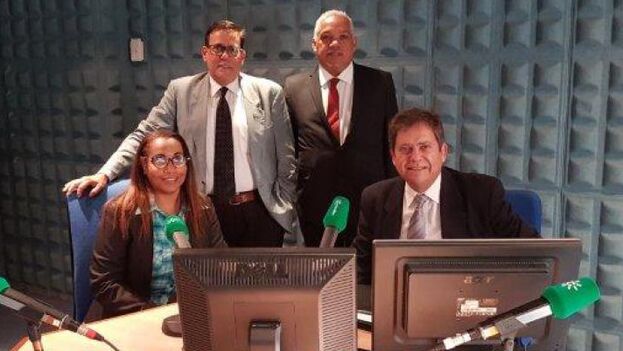
![]() 14ymedio, Havana, 13 January 2022 — Alberto González Casals, director of the Cuban International Press Center (CPI), has been included by the Foundation for Human Rights in Cuba (FDHC) in its database of repressors.
14ymedio, Havana, 13 January 2022 — Alberto González Casals, director of the Cuban International Press Center (CPI), has been included by the Foundation for Human Rights in Cuba (FDHC) in its database of repressors.
In a statement issued this Thursday, the Miami-based organization details that they have included González Casals as a “white-collar repressor” and as an “’export’ repressor.”
The first, for being “directly responsible for executing the orders of the Ministry of the Interior regarding the withdrawal of credentials to work in Cuba from journalists from the Spanish agency EFE,” and the second, “for having been part of the Cuban intervention in Venezuela, helping Havana to reorganize the country’s intelligence and counterintelligence services in its favor.”
They also detail that González Casals, responsible within the Ministry of Foreign Affairs for the foreign press since 2017, is a lieutenant colonel of the Intelligence Directorate who has worked “with diplomatic cover in countries such as Angola, Venezuela and the United States.”
The Foundation recalls that last November 13, five members of the agency were summoned to the CPI to have their credentials withdrawn, arguing that EFE “had put its editorial line at the service of the counterrevolution.”
In reality, what bothered the Cuban government, in the opinion of the FDHC, was that the Spanish agency, “fulfilling its obligations of journalistic objectivity, had covered the historic protests of July 11 and 12 (11J) in Cuba and was already covering the preparations for the march that had been called for November 15.”
The NGO asserts that the reprisals against EFE are part of the “information blackout” imposed by the regime after the 11J demonstrations. “The information blockade includes more censorship of the official media, additional pressure on foreign correspondents accredited in Cuba and more reprisals against the independent press,” the Foundation said, to which it adds selective or total cuts to the Internet service within the island. .
“The CPI, in the best Stalinist tradition that violates international human rights conventions, filters foreign journalists and rules out the accreditation of those it considers critical,” the statement asserts.
“In order to carry out journalistic work in Cuba, it requires a D-6 visa that can be suspended, revoked or not extended, including the expulsion of the correspondent from the country if it is believed that they have carried out ’inappropriate actions or actions outside their profile and work content, as well as when it is considered that they have lacked journalistic ethics and/or does not comply with objectivity in their offices’.”
The Foundation denounces this strategy of the Díaz-Canel government, while hoping “that EFE does not fold to it or close its presence in Cuba.”
A few days ago, the database of repressors had been updated with the names of a dozen prosecutors, in addition to a judge, participating in the trials of the 11J protesters, which will conclude tomorrow in several cities in the country.
____________
COLLABORATE WITH OUR WORK: The 14ymedio team is committed to practicing serious journalism that reflects Cuba’s reality in all its depth. Thank you for joining us on this long journey. We invite you to continue supporting us by becoming a member of 14ymedio now. Together we can continue transforming journalism in Cuba.
